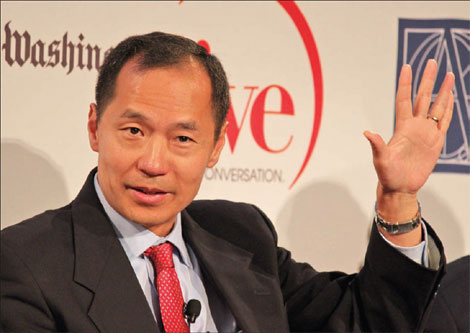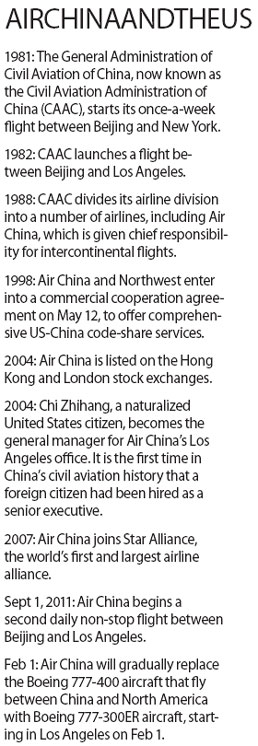Executive integral part of Air China
Updated: 2012-01-13 11:07
By Wang Jun (China Daily)
|
||||||||
|
Chi Zhihang has become a strong advocate for the loosening of visa restrictions for Chinese visitors. [Zhang Yuwei / China Daily] |
Chi Zhihang is aptly named for his job as the head of North American operations for China's flagship carrier.
Zhihang in Chinese means aspiration for aviation, and as vice-president and general manager of Air China North America, the 48-year-old Beijing native has helped oversee the development of one of the most important markets for Air China, the world's largest carrier by market value, according to the International Air Transport Association.
Air China's unprecedented growth brought the company 12 billion yuan ($1.83 billion) net profit in 2010, according to Air China's annual report, making it the most profitable airline in the world, Air Transport World reported.
|
|
As a child, Chi memorized every single page of the aviation industry reference book, Jane's All World's Aircraft. Perhaps he was following in the footsteps of his parents, who were professors at Beijing University of Aeronautics & Aeronautics and "loved what they did", Chi said.
But, when he was readying for college, he realized that by becoming an aviation major would probably mean being assigned a job in some remote outpost after graduation, as most aviation majors who worked for the national defense did in the early 1980's. Chi chose to major in mechanical engineering instead.
The Chinese aviation industry has come a long way since the early 1980s. In 1981, the General Administration of Civil Aviation of China, now known as Civil Aviation Administration of China (CAAC), started a once-a-week China-US flight between Beijing and New York. In the spring of 1982, CAAC launched a flight between Beijing and Los Angeles.
At that time, the main purpose of the international flights was to take government leaders abroad for meetings and to send athletes to competitions, Chi said. The joke at the time was that CAAC stood for "Chinese airlines always canceled", Chi recalled, meaning performance wasn't important because commercial success wasn't important.
Chi flew to the US in 1988 via Beijing, Shanghai, San Francisco, Los Angeles, New York and landed in Boston to start the graduate program at Massachusetts Institute of Technology's Sloan School of Management.
"It took close to 24 hours," he recalled.
At the time, there were less than 30 flights between China and the US per week on any airline. Now, Air China alone has 28 flights connecting the two countries on a weekly basis, Chi said.
The same year that Chi landed in the US, China's civil aviation industry underwent an overhaul. The airline division of CAAC was divided in to six airlines, each named after the region where it had its hub, with CAAC acting solely as a government administrative and regulatory agency.
The six airlines were subsequently consolidated into three in 2002: the Beijing-based Air China International Corporation, the Shanghai-based China Eastern Airlines and Guangzhou-based China Southern Airlines. Air China International Corporation had all of the international routes at that time. Other Chinese airlines have caught up in recent years.
In 1994, Chi obtained a doctorate from MIT. His thesis topic, Dynamic and Network Effects in Airline Yield Management, guided by Dimitris Bertsimas, was a return to his early interest in aviation. Chi was recruited by Northwest Airlines that same year. For the next nine years, he worked in technical, marketing and management positions in Minneapolis, rising to the level of director. One of his major contributions to Northwest was developing the company's strategic alliance with Air China.
When Air China was searching for someone to manage its US operations, Zhang Lan, former executive vice-president of Air China, recruited Chi.
Chi was hired as the general manager for the Air China's Los Angeles office in 2004. It is the first time in China's civil aviation history that a foreign citizen had been hired as a senior executive (Chi is a naturalized US citizen).
"I know the position was very challenging," Chi said, "because I understood Air China's problems from our (Northwest's) alliance with them. However, it was irresistible to me to try to solve those problems."
One major problem was organizational. Air China had three offices in the US: San Francisco, Los Angeles and New York. They operated like three independent airlines, Chi said. Each had its own toll-free number, marketing strategy, sales plan and operational system; they even competed against each other for customers.
In 2006, the West Coast offices consolidated, with Los Angeles as the West Coast headquarters. Chi was appointed the general manager of the western US region.
Two years later, Chi was promoted to vice-president and general manager for North America, and was based in Los Angeles. All offices, including the New York office and Vancouver office, were placed under centralized management with a unified sales policy and centralized financial system.
According to Chi, Air China's next step will be to further streamline operations and customer service by adding directors to oversee those functions in all of the North America offices.
"Our models are Lufthansa and Cathay Pacific Airways, which we highly respect," Chi said. "Both of them operate by function, not location."
On Sept 1, Air China began a second daily non-stop flight between Beijing and Los Angeles. Before the second flight was added, seats on the flights were 90 percent full, on average, and 95 percent full during peak seasons. Now, flights are about 80 percent full, the airline reported.
At the inauguration of the second flight in Los Angeles, Air China Vice-Chairman Wang Yinxiang said that it took the airline 24 years to offer daily flights between Beijing and Los Angeles, but only five years to add a second flight. Chi attributed this to China's rapid economic development that has allowed more people to travel.
In 2012, Air China will gradually replace the Boeing 777-400 aircraft that fly between China and North America with Boeing 777-300ER aircraft. The first aircraft should debut in Los Angeles on Feb 1. The new twin-engine aircraft will save the company about 40 percent in operation costs - it burns four tons less fuel per hour than the current four-engine aircraft.
Growing with the company for the past eight years, Chi now finds himself working on something bigger than Air China - the China-US relationship.
Addressing the Global China Summit, an event at the United States Institute of Peace on Sept 27 attended by former US Secretary of State Henry Kissinger and former UK Foreign Secretary David Miliband, Chi, along with other participants, called for the US government to speed up the visa process and to allow more Chinese tourists and businesses to enter the US.
According to Chi, 1.1 million South Koreans came to the US in 2010, while only 750,000 Chinese were allowed into the country, even though China's population is 27 times that of South Korea's. The main reason for the difference: the US' tight visa restrictions on Chinese citizens.
"My biggest challenge in doing business here is that I cannot get enough people (to fly from China to America)," he told an audience of statesmen, scholars and officials.
Chi has become a strong advocate for the loosening of visa restrictions for Chinese visitors, giving speeches and lobbying US government agencies. On Nov 3, Chi was given the China Business Leadership Award for his "distinguished contribution to US-China relations" by the US-China Policy Foundation.
"My business is to bring people together," Chi said.
China Daily
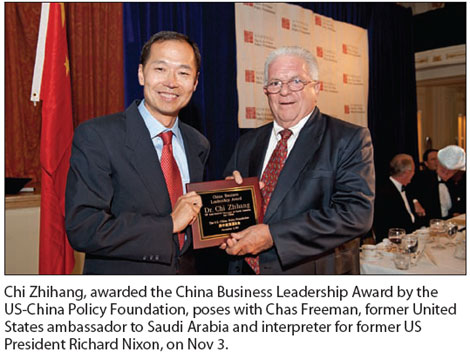
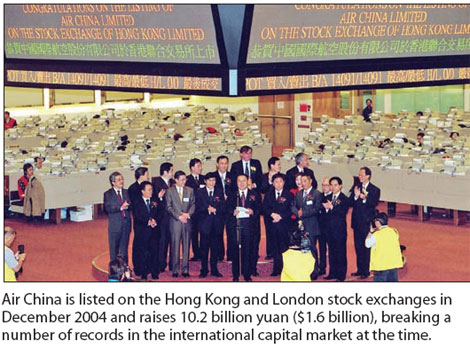
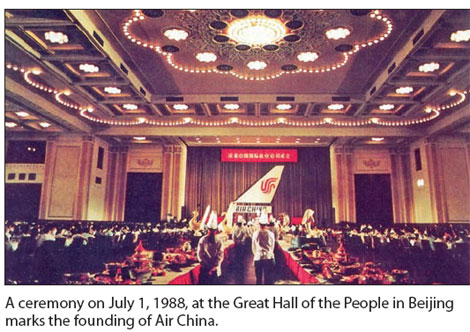
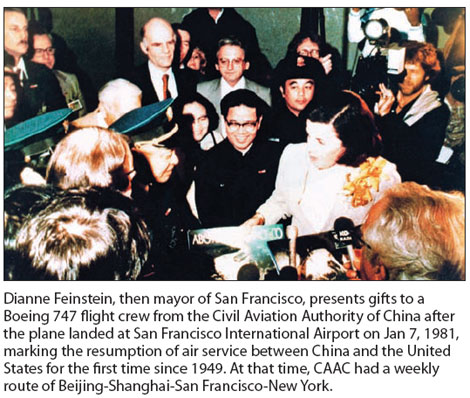
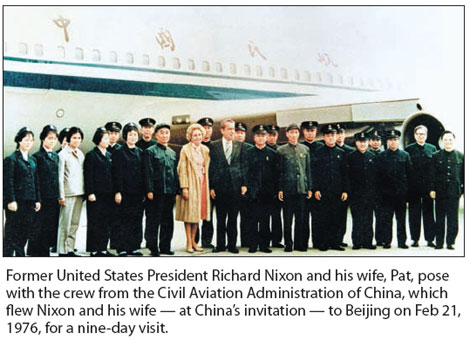

 Relief reaches isolated village
Relief reaches isolated village
 Rainfall poses new threats to quake-hit region
Rainfall poses new threats to quake-hit region
 Funerals begin for Boston bombing victims
Funerals begin for Boston bombing victims
 Quake takeaway from China's Air Force
Quake takeaway from China's Air Force
 Obama celebrates young inventors at science fair
Obama celebrates young inventors at science fair
 Earth Day marked around the world
Earth Day marked around the world
 Volunteer team helping students find sense of normalcy
Volunteer team helping students find sense of normalcy
 Ethnic groups quick to join rescue efforts
Ethnic groups quick to join rescue efforts
Most Viewed
Editor's Picks

|

|

|

|

|

|
Today's Top News
Health new priority for quake zone
Xi meets US top military officer
Japan's boats driven out of Diaoyu
China mulls online shopping legislation
Bird flu death toll rises to 22
Putin appoints new ambassador to China
Japanese ships blocked from Diaoyu Islands
Inspired by Guan, more Chinese pick up golf
US Weekly

|

|
